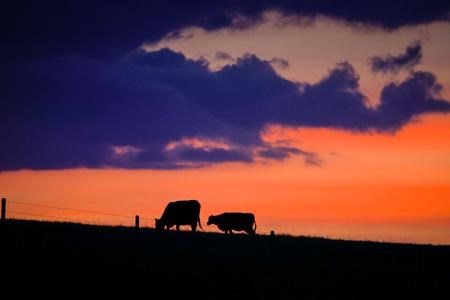Alberta
Recent rain may not be enough to halt the shrinking of Canada’s cattle herd

CALGARY — Anxious Alberta ranchers praying for rain got their wish this week, but it may not be enough to stop the ongoing decline in Canadian cattle production.
The moisture that fell on parts of drought-parched Alberta came as a welcome reprieve to the hundreds of cattle farmers who have seen their pastures wither and their water supplies dry up this June.
But a few inches of rain won’t be enough to cut it in much of Canadian cattle country, which is still trying to dig its way out of a significant moisture deficit.
“I think this is the driest I’ve ever seen it,” said Bob Lowe, a rancher and feedlot operator from the Nanton area of southern Alberta.
“The grass started this spring, and came up a little bit, and then it just turned around and died. It’s supposed to be green this time of year, but it’s just grey-brown.”
According to Agriculture Canada’s Drought Monitor, 82 per cent of the agricultural regions of the three prairie provinces were either “abnormally dry” or in “moderate to extreme drought” as of the end of May.
Some ranchers have been spending hours every day this spring hauling water by truck or trailer to their cattle after their watering holes completely dried up, said Ryder Lee, general manager of the Canadian Cattle Association.
“Or they’re filling dugouts from other places with pipelines and pumps,” Lee said.
“There’s lots of creativity and ingenuity in the industry, but all of that takes a toll on people.”
It also takes a toll on an industry that has already been steadily shrinking for years. Last year, the size of the Canadian cattle herd fell to 12.3 million animals — the lowest level recorded since July 1, 1988.
The 2.8 per cent year-over-year reduction was in large part due to the after-effects of an extremely harsh drought on the prairies in 2021. As crops withered and feed prices skyrocketed, many ranchers sold their cattle for slaughter rather than holding onto them for breeding.
That could happen again this year, and at an even larger scale, said Rob Somerville, who has a cattle farm in east-central Alberta, near the town of Innisfail.
“There is a train of thought that people who may have hung on last time, this time, will sell,” Somerville said.
He added that some producers might have hesitated to sell in 2021 because cattle prices at the time were low. But as cattle numbers in North America have continued to shrink, prices have increased, hitting all-time records this spring.
“Just about everybody I’ve spoken to has already prepared a list of the cows they’re going to sell. These people won’t be leaving the industry, but they’re certainly planning a herd reduction.”
South of the border, U.S. cattle inventory is also down four per cent year-over-year due to increased heifer slaughter. According to a report by the U.S. Department of Agriculture, roughly 69 per cent of the U.S. cattle herd as of December 2022 was located in drought-stricken areas, leading to the largest contraction of the North American cattle herd in a decade.
Other catastrophes in the last two decades — including the BSE (mad cow) crisis and the 2009 financial crisis — also led ranchers to downsize their herds or exit the industry entirely.
As a result, according to Statistics Canada, there are 25 per cent fewer beef cows in Canada now than there were in 2005.
“After a while it’s not just an individual farm-by-farm thing, it’s an industry issue. And that has far wider implications,” Somerville said, adding that fewer cows could cause ripple effects all the way down the value chain — potentially leading to lost jobs at feedlots, at meat-packing plants and more.
“This is a big contributor to the economy that we’re talking about.”
Winnipeg-based cattle markets analyst Jerry Klassen said he believes one or two good rains could save the industry from wide-spread liquidation of herds this year.
“You can still get one good hay crop in Alberta if you get timely rains from now moving forward,” Klassen said.
“And you’ve got these high prices. If the farmer can maintain or increase his herd, he’s going to reap the rewards over the next two or three years.”
But Somerville said multiple years of dry conditions have left some ranchers feeling that they’re “running out of tricks they can pull out of the hat.”
“There’s a lot of producers who have been hanging on as long as they can and they may decide now is the time to get out of the industry,” he said.
“It’s just been too many struggles, for too long.”
This report by The Canadian Press was first published June 16, 2023.
Amanda Stephenson, The Canadian Press
Alberta
Alberta judge sides with LGBT activists, allows ‘gender transitions’ for kids to continue

From LifeSiteNews
‘I think the court was in error,’ Alberta Premier Danielle Smith has said. ‘There will be irreparable harm to children who get sterilized.’
LGBT activists have won an injunction that prevents the Alberta government from restricting “gender transitions” for children.
On June 27, Alberta King’s Court Justice Allison Kuntz granted a temporary injunction against legislation that prohibited minors under the age of 16 from undergoing irreversible sex-change surgeries or taking puberty blockers.
“The evidence shows that singling out health care for gender diverse youth and making it subject to government control will cause irreparable harm to gender diverse youth by reinforcing the discrimination and prejudice that they are already subjected to,” Kuntz claimed in her judgment.
Kuntz further said that the legislation poses serious Charter issues which need to be worked through in court before the legislation could be enforced. Court dates for the arguments have yet to be set.
READ: Support for traditional family values surges in Alberta
Alberta’s new legislation, which was passed in December, amends the Health Act to “prohibit regulated health professionals from performing sex reassignment surgeries on minors.”
The legislation would also ban the “use of puberty blockers and hormone therapies for the treatment of gender dysphoria or gender incongruence” to kids 15 years of age and under “except for those who have already commenced treatment and would allow for minors aged 16 and 17 to choose to commence puberty blockers and hormone therapies for gender reassignment and affirmation purposes with parental, physician and psychologist approval.”
Just days after the legislation was passed, an LGBT activist group called Egale Canada, along with many other LGBT organizations, filed an injunction to block the bill.
In her ruling, Kuntz argued that Alberta’s legislation “will signal that there is something wrong with or suspect about having a gender identity that is different than the sex you were assigned at birth.”
She further claimed that preventing minors from making life-altering decisions could inflict emotional damage.
However, the province of Alberta argued that these damages are speculative and the process of gender-transitioning children is not supported by scientific evidence.
“I think the court was in error,” Alberta Premier Danielle Smith said on her Saturday radio show. “That’s part of the reason why we’re taking it to court. The court had said there will be irreparable harm if the law goes ahead. I feel the reverse. I feel there will be irreparable harm to children who get sterilized at the age of 10 years old – and so we want those kids to have their day in court.”
READ: Canadian doctors claim ‘Charter right’ to mutilate gender-confused children in Alberta
Overwhelming evidence shows that persons who undergo so-called “gender transitioning” procedures are more likely to commit suicide than those who are not given such irreversible surgeries. In addition to catering to a false reality that one’s sex can be changed, trans surgeries and drugs have been linked to permanent physical and psychological damage, including cardiovascular diseases, loss of bone density, cancer, strokes and blood clots, and infertility.
Meanwhile, a recent study on the side effects of “sex change” surgeries discovered that 81 percent of those who have undergone them in the past five years reported experiencing pain simply from normal movements in the weeks and months that followed, among many other negative side effects.
Alberta
Alberta Independence Seekers Take First Step: Citizen Initiative Application Approved, Notice of Initiative Petition Issued

Alberta’s Chief Electoral Officer, Gordon McClure, has issued a Notice of Initiative Petition.
This confirms a Citizen Initiative application has been received and the Chief Electoral Officer has determined the requirements of section 2(3) of the Citizen Initiative Act have been met.
Approved Initiative Petition Information
The approved citizen initiative application is for a policy proposal with the following proposed question:
Do you agree that Alberta should remain in Canada?
The Notice of Initiative Petition, application, and statement provided by the proponent are available on Elections Alberta’s website on the Current Initiatives Petition page.
As the application was received and approved prior to coming into force of Bill 54: Election Statutes Amendment Act, the Citizen Initiative process will follow requirements set out in the Citizen Initiative Act as of June 30, 2025.
Next Steps
- The proponent must appoint a chief financial officer within 30 days (by July 30, 2025).
- Once the 30-day publication period is complete and a chief financial officer has been appointed, Elections Alberta will:
- issue the citizen initiative petition,
- publish a notice on the Current Initiatives Petition page of our website indicating the petition has been issued, specifying the signing period dates, and the number of signatures required for a successful petition, and
- issue the citizen initiative petition signature sheets and witness affidavits. Signatures collected on other forms will not be accepted.
More information on the process, the status of the citizen initiative petition, financing rules, third party advertising rules, and frequently asked questions may be found on the Elections Alberta website.
Elections Alberta is an independent, non-partisan office of the Legislative Assembly of Alberta responsible for administering provincial elections, by-elections, and referendums.
-

 Brownstone Institute2 days ago
Brownstone Institute2 days agoFDA Exposed: Hundreds of Drugs Approved without Proof They Work
-

 Energy1 day ago
Energy1 day agoChina undermining American energy independence, report says
-

 Business1 day ago
Business1 day agoTrump on Canada tariff deadline: ‘We can do whatever we want’
-

 Automotive1 day ago
Automotive1 day agoElectric vehicle sales are falling hard in BC, and it is time to recognize reality.
-

 Business1 day ago
Business1 day agoEurope backs off greenwashing rules — Canada should take note
-

 Automotive1 day ago
Automotive1 day agoPower Struggle: Electric vehicles and reality
-

 Business7 hours ago
Business7 hours agoCanada Caves: Carney ditches digital services tax after criticism from Trump
-

 Bruce Dowbiggin6 hours ago
Bruce Dowbiggin6 hours agoThe Game That Let Canadians Forgive The Liberals — Again






